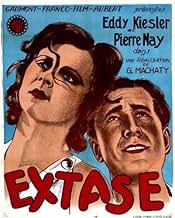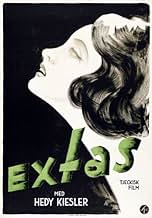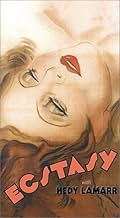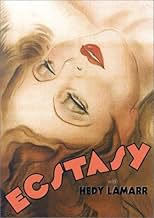AVALIAÇÃO DA IMDb
6,6/10
3 mil
SUA AVALIAÇÃO
Adicionar um enredo no seu idiomaEva has just got married to an older gentleman. She leaves him, and one day, she meets a young man, and they fall in love. Fate brings the husband together with the young lover that has take... Ler tudoEva has just got married to an older gentleman. She leaves him, and one day, she meets a young man, and they fall in love. Fate brings the husband together with the young lover that has taken Eva from him.Eva has just got married to an older gentleman. She leaves him, and one day, she meets a young man, and they fall in love. Fate brings the husband together with the young lover that has taken Eva from him.
- Direção
- Roteiristas
- Artistas
- Prêmios
- 2 vitórias e 1 indicação no total
Hedy Lamarr
- Eva Hermann
- (as Hedy Kiesler)
Emil Jerman
- Eva's husband
- (narração)
Antonín Kubový
- Landarbeiter
- (as Antonin Kibový)
Bedrich Vrbský
- Eva's father
- (narração)
Jirina Stepnicková
- Eva
- (narração)
Ladislav Bohác
- Adam
- (não creditado)
Comedian Harmonists
- Themselves
- (não creditado)
Kani Kipçak
- Dr. Brady
- (não creditado)
Karel Macha-Kuca
- Der Rechtsanwalt
- (não creditado)
Jirina Steimarová
- Typist
- (não creditado)
Avaliações em destaque
There's no entertainment value in this confusing montage fest. There's a love triangle melodrama wrapped inside, but it's not worth the price of admission. I suspect the film is dripping with all sorts of symbolism, but what it says is never entirely clear. We get shots of flowers, horses, pick axes, and flies, flies, flies. The artsy montages interrupt the story whenever possible and go on and on, overstaying their welcome after delivering their messages.
This practically silent Czech-made movie is notable today for its nude and erotic scenes with Hedy Lamarr, years before she became a star in Hollywood. The scenes, tastefully done, really pushed the envelope back in the early 1930s, giving this film some historical significance.
It boggles my mind to see so many rave reviews for this film. Sure, it has its claims to cinematic history, but this is not a very good film. It is way too drawn out, weighed down by heavy-handed symbolism, and ultimately unsatisfying. A footnote in a textbook, sure, but no masterpiece.
Perhaps one must possess a certain artistic mind to fully appreciate this film's "poetry". If that is the case, I guess I just don't have it.
Not worth your time except as a curiosity for the rabid cinephile.
This practically silent Czech-made movie is notable today for its nude and erotic scenes with Hedy Lamarr, years before she became a star in Hollywood. The scenes, tastefully done, really pushed the envelope back in the early 1930s, giving this film some historical significance.
It boggles my mind to see so many rave reviews for this film. Sure, it has its claims to cinematic history, but this is not a very good film. It is way too drawn out, weighed down by heavy-handed symbolism, and ultimately unsatisfying. A footnote in a textbook, sure, but no masterpiece.
Perhaps one must possess a certain artistic mind to fully appreciate this film's "poetry". If that is the case, I guess I just don't have it.
Not worth your time except as a curiosity for the rabid cinephile.
Dripping with symbolism and filled with marvelous cinematography, Extase is so much more than the erotic drama we've all come to expect. This is almost a silent film, with what dialogue there is in German, and highly simplified German at that. Perhaps the filmmakers intended the film to reach the widest possible European audience, as anyone with even a little high school level Deutsch can easily dispense with the subtitles. The story is of little importance anyway, with the film succeeding on a cinematic level, not a narrative one. Symbols of fecundity and the power of nature overwhelm the human characters--there are even scenes where flowers obscure the face of supposed star Hedy Lamarr--and there are moments here that will remind viewers of the works of Dreyer, Vertov, and Riefenstahl. If the film has any message to convey, I think it's a political one: bourgeois man is timid and impotent; working class man is a happy, productive creature; and woman is the creator, destined to be unfulfilled until she has borne a child. This blend of Soviet socialist realism and National Socialist dogma doesn't overwhelm the film by any means--it's a beauty to watch from beginning to end--but it does place it in a very distinct artistic era. And, oh yeah, Hedy does get her kit off.
Eva (Hedy Lamarr) has just got married with an older man and in the honeymoon, she realizes that her husband does not desire her. Her disappointment with the marriage and the privation of love, makes Eva returning to her father's home in a farm, leaving her husband. One afternoon, while bathing in a lake, her horse escapes with her clothes and an young worker retrieves and gives them back to Eva. They fall in love for each other and become lovers. Later, her husband misses her and tries to have Eva back home. Eva refuses, and fortune leads the trio to the same place, ending the affair in a tragic way.
I have just watched "Extase" for the first time, and the first remark I have is relative to the horrible quality of the VHS released in Brazil by the Brazilian distributor Video Network: the movie has only 75 minutes running time, and it seems that it was used different reels of film. There are some parts totally damaged, and other parts very damaged. Therefore, the beauty of the images in not achieved by the Brazilian viewer, if he has a chance to find this rare VHS in a rental or for sale. The film is practically a silent movie, the story is very dated and has only a few lines. Consequently, the characters are badly developed. However, this movie is also very daring, with the exposure of Hedy Lamarr beautiful breasts and naked fat body for the present standards of beauty. Another fantastic point is the poetic and metaphoric used of flowers, symbolizing the intercourse between Eva and her lover. The way the director conducts the scenes to show the needs and privation of Eva is very clear. The non-conclusive end is also very unusual for a 1933 movie. I liked this movie, but I hope one day have a chance to see a 87 minutes restored version. My vote is eight.
Title (Brazil): "Êxtase" ("Ecstasy")
I have just watched "Extase" for the first time, and the first remark I have is relative to the horrible quality of the VHS released in Brazil by the Brazilian distributor Video Network: the movie has only 75 minutes running time, and it seems that it was used different reels of film. There are some parts totally damaged, and other parts very damaged. Therefore, the beauty of the images in not achieved by the Brazilian viewer, if he has a chance to find this rare VHS in a rental or for sale. The film is practically a silent movie, the story is very dated and has only a few lines. Consequently, the characters are badly developed. However, this movie is also very daring, with the exposure of Hedy Lamarr beautiful breasts and naked fat body for the present standards of beauty. Another fantastic point is the poetic and metaphoric used of flowers, symbolizing the intercourse between Eva and her lover. The way the director conducts the scenes to show the needs and privation of Eva is very clear. The non-conclusive end is also very unusual for a 1933 movie. I liked this movie, but I hope one day have a chance to see a 87 minutes restored version. My vote is eight.
Title (Brazil): "Êxtase" ("Ecstasy")
This was a very daring film for it's day. It could even be described as soft-core porn for the silent era. It was a talkie, but dialog was extremely limited, and in German. One did not need it anyway.
The young (19) Hedy Lamarr gets trapped in a loveless marriage to an obsessive (stereotype?) German and after a short time in a marriage that was apparently never consummated, returns home to her father.
In a famous and funny scene, she decides to go skinny dipping one morning when her horse is distracted by another. She is then forced to run across a field chasing after it, as she left her clothing on the horse. An engineer retrieves her horse and returns her clothing - after getting an eyeful.
They sit for a while and, in a zen moment, he presents her with a flower with a bee sitting on top. This is where she thinks back to her honeymoon and the actions of her husband and an insect. She knows this man is different.
She returns home and eventually seeks out our young fellow, and finds the ecstasy she was denied. You can use your imagine here, but his head disappears from view and we see her writhing with pleasure. Since he never got undressed, you can imagine... Certainly, an homage to women by the director Gustav Machatý, and a shock to 1933 audiences.
The only thing that mars this beautifully filmed movie is the excessive guilt, and a strange ending.
The young (19) Hedy Lamarr gets trapped in a loveless marriage to an obsessive (stereotype?) German and after a short time in a marriage that was apparently never consummated, returns home to her father.
In a famous and funny scene, she decides to go skinny dipping one morning when her horse is distracted by another. She is then forced to run across a field chasing after it, as she left her clothing on the horse. An engineer retrieves her horse and returns her clothing - after getting an eyeful.
They sit for a while and, in a zen moment, he presents her with a flower with a bee sitting on top. This is where she thinks back to her honeymoon and the actions of her husband and an insect. She knows this man is different.
She returns home and eventually seeks out our young fellow, and finds the ecstasy she was denied. You can use your imagine here, but his head disappears from view and we see her writhing with pleasure. Since he never got undressed, you can imagine... Certainly, an homage to women by the director Gustav Machatý, and a shock to 1933 audiences.
The only thing that mars this beautifully filmed movie is the excessive guilt, and a strange ending.
(No need to recap the plot, since others have done so already.)
It's understandable that many viewers find fault with the film, raised as we are with the slam-bang sensurround of today's cineplex experience. Against that background, a movie like Ecstasy appears to have wandered in from another planet. I think there are several worthwhile reasons why.
Most importantly, the film unfolds poetically, as the camera pans slowly over surrounding hills, trees, clouds, etc., providing a serene and lyrical sense of a natural world that integrates the man and woman into its fold. Together these reveal a style and dimension almost totally missing from today's technology-driven cinema, where rapid-fire editing works to divert audience attention and not to concentrate it. Additionally, the story is conveyed by eye and not by ear, with almost no dialogue to explain what's happening. This amounts to another extreme departure from today's very literal fare, where visuals only seem to count when they excite the audience. But perhaps most unsettling-- the movie is sometimes eerily quiet, not in the sense that silent films are quiet since we expect them to be. But in the sense that the characters seldom speak when we expect them to. Thus, the burden of the story is shared between the film-maker and the viewer. The former must choose his visuals artfully so as to convey the narrative, while the latter must think about those visuals, since they're not going to be explained.
None of this is intended to belittle today's film-making. It's simply to point out that a movie like Machaty's comes out of a very different aesthetic from the one we have today. I don't claim either to be any better or worse. However, I do claim that Ecstasy represents a perspective sorely missing from today's movie-going experience, where such 'contemplative values are routinely dismissed as slow and boring.
The film itself is no masterpiece, though at times it reaches artistic heights, as in the beautifully composed beer-garden scene with its final crane shot rising to reveal the exquisite tableau below. The slow pans of the countryside with its pantheistic celebration of life, nature, and regeneration are also wonderfully expressed. These are the kind of scenes that don't overwhelm you, but instead-- given half-a chance-- accumulate quietly into an experience as memorable in its own way as the spine-tingling variety of a "Jaws".
On the other hand, the film is sometimes heavy-handed, as when Machaty piles on the imagery, particularly in the final, ode-to-labor sequence. It's hard to know what to make of this rather disruptive presence. Perhaps the symbolism has to do with the heroic dimension that hard work holds for the love-lorn hero and people in general-- a theme then being promoted by the influential Soviet cinema. Still, its presence here is rather tediously over-done.
Anyhow, I've got to admit that I tuned in initially to see the gorgeous Hedy LaMarr in the buff. But now I have to admit that in the process I also got a lot more than just a peek-a-boo romp in the woods.
It's understandable that many viewers find fault with the film, raised as we are with the slam-bang sensurround of today's cineplex experience. Against that background, a movie like Ecstasy appears to have wandered in from another planet. I think there are several worthwhile reasons why.
Most importantly, the film unfolds poetically, as the camera pans slowly over surrounding hills, trees, clouds, etc., providing a serene and lyrical sense of a natural world that integrates the man and woman into its fold. Together these reveal a style and dimension almost totally missing from today's technology-driven cinema, where rapid-fire editing works to divert audience attention and not to concentrate it. Additionally, the story is conveyed by eye and not by ear, with almost no dialogue to explain what's happening. This amounts to another extreme departure from today's very literal fare, where visuals only seem to count when they excite the audience. But perhaps most unsettling-- the movie is sometimes eerily quiet, not in the sense that silent films are quiet since we expect them to be. But in the sense that the characters seldom speak when we expect them to. Thus, the burden of the story is shared between the film-maker and the viewer. The former must choose his visuals artfully so as to convey the narrative, while the latter must think about those visuals, since they're not going to be explained.
None of this is intended to belittle today's film-making. It's simply to point out that a movie like Machaty's comes out of a very different aesthetic from the one we have today. I don't claim either to be any better or worse. However, I do claim that Ecstasy represents a perspective sorely missing from today's movie-going experience, where such 'contemplative values are routinely dismissed as slow and boring.
The film itself is no masterpiece, though at times it reaches artistic heights, as in the beautifully composed beer-garden scene with its final crane shot rising to reveal the exquisite tableau below. The slow pans of the countryside with its pantheistic celebration of life, nature, and regeneration are also wonderfully expressed. These are the kind of scenes that don't overwhelm you, but instead-- given half-a chance-- accumulate quietly into an experience as memorable in its own way as the spine-tingling variety of a "Jaws".
On the other hand, the film is sometimes heavy-handed, as when Machaty piles on the imagery, particularly in the final, ode-to-labor sequence. It's hard to know what to make of this rather disruptive presence. Perhaps the symbolism has to do with the heroic dimension that hard work holds for the love-lorn hero and people in general-- a theme then being promoted by the influential Soviet cinema. Still, its presence here is rather tediously over-done.
Anyhow, I've got to admit that I tuned in initially to see the gorgeous Hedy LaMarr in the buff. But now I have to admit that in the process I also got a lot more than just a peek-a-boo romp in the woods.
Você sabia?
- CuriosidadesFirst surviving non-pornographic film to depict a woman having an orgasm.
- Erros de gravaçãoIn the beginning when Emil is in the bedroom, a closeup of the photo on the bedside table is shown to have writing on it. On the second closeup, when Emil is carefully rearranging his keys and other items, there is no writing.
- Citações
Eva Hermann: Tell him... no. Don't tell him anything.
- Versões alternativasTo get the film around the more conservative German censors, an alternate version of Hedy Lamarr's nude bathing scenes was shot in which she was partially obscured by strategically-placed bushes.
- ConexõesEdited into Histoire(s) du cinéma: Fatale beauté (1994)
Principais escolhas
Faça login para avaliar e ver a lista de recomendações personalizadas
- How long is Ecstasy?Fornecido pela Alexa
Detalhes
- Tempo de duração
- 1 h 22 min(82 min)
- Cor
- Mixagem de som
- Proporção
- 1.19 : 1
Contribua para esta página
Sugerir uma alteração ou adicionar conteúdo ausente

































